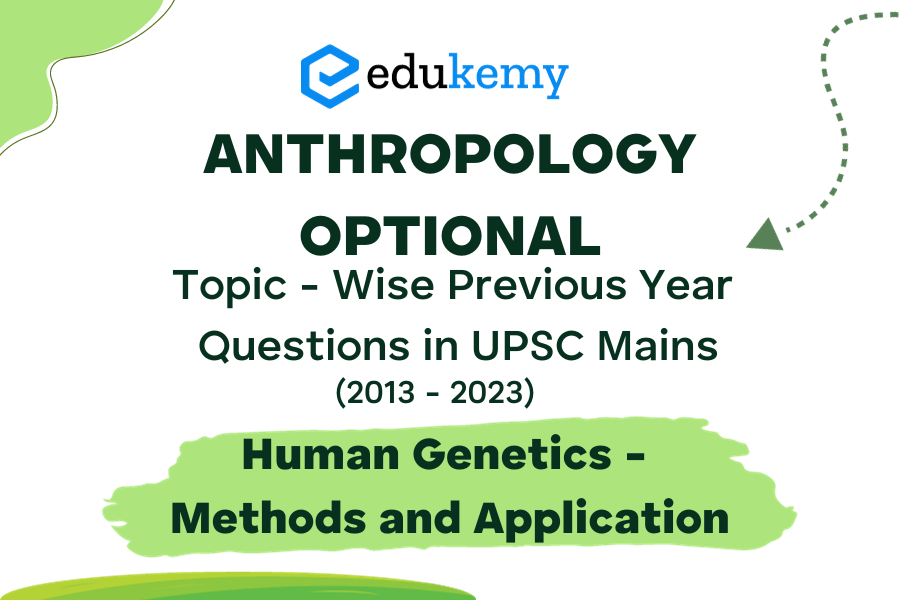
Embarking on the journey of civil services examination, particularly the UPSC mains, demands a nuanced understanding of each optional subject. Among the myriad choices available, Anthropology stands out as a subject deeply rooted in exploring human societies, cultures, and biological diversity. This blog series focuses on the Anthropology optional paper, with a specific lens on the Human Genetics section. We delve into the intricacies of Human Genetics – Methods and Applications, exploring the evolution of questions asked in UPSC mains from 2013 to 2023. This comprehensive analysis aims to provide aspiring civil servants with valuable insights into the evolving questioning patterns, allowing them to tailor their preparation strategies effectively.
Human Genetics is a crucial aspect of Anthropology, offering a bridge between the biological and cultural dimensions of the subject. As we journey through the previous years’ questions, we uncover the dynamic nature of inquiries, ranging from traditional topics to contemporary issues. By dissecting the nuances of the questions asked by the UPSC over the past decade, this blog series aims to equip candidates with a strategic approach to mastering Human Genetics in Anthropology. Whether you are a seasoned aspirant seeking fine-tuning or a novice delving into the world of Anthropology, join us in unraveling the intricacies of Human Genetics through the lens of UPSC mains’ previous year questions.
Contents
- 1 Human Genetics – Methods and Application – Previous Year Questions (UPSC CSE Mains Anthropology Optional)
- 2 Frequently Asked Questions (FAQs)
- 2.1 Q: What are the key methods employed in Human Genetics, particularly in the context of Anthropology?
- 2.2 Q: How does Human Genetics contribute to Anthropological research and analysis?
- 2.3 Q: What are the contemporary applications of Human Genetics in society and healthcare?
- 2.4 Q: How has the focus on Human Genetics evolved in UPSC Anthropology optional exams over the past decade?
- 2.5 Q: What are the challenges and controversies surrounding the use of Human Genetics in Anthropological studies?
- 3 In case you still have your doubts, contact us on 9811333901.
Human Genetics – Methods and Application – Previous Year Questions (UPSC CSE Mains Anthropology Optional)
Methods for study of genetic principles in man-family study (pedigree analysis, twin study, foster child, co-twin method, cytogenetic method, chromosomal and karyo-type analysis), biochemical methods, immunological methods, D.N.A technology and recombinant technologies
1. “Genetic similarities far outweigh the racial differences among men.” Discuss. (1981)
2. Write a note on Heredity and environment. (1988)
3. Discuss the genetical and clinical aspects of the anomalies of sex chromosomes in man with special reference to the associated mosaic constitutions. (1995)
4. Why are gender studies gaining importance these days? Assess the contribution of anthropology to gender studies. (1996)
5. Discuss the recent developments in genetic techniques and comment upon their potential social significance. (1997)
6. Define twins. Describe the method of diagnosis of twins. In what ways are twins useful in the study of human genetics? (1998)
7. Discuss the role of twins in nature-nurture problems and illustrate your answer with suitable examples. (1999)
8. What do you understand by recombinant DNA technology? Discuss its application and limitations in improving human health. (2000)
9. Write a note on Recombinant DNA technology (2001)
10. Write a note on Pedigree Analysis (2007)
11. Write a note in 150 words on Twin method in human genetics (2013)
12. Briefly describe the various methods used in the genetic study of man. (2017)
Frequently Asked Questions (FAQs)
Q: What are the key methods employed in Human Genetics, particularly in the context of Anthropology?
Understanding the methodologies used in Human Genetics is fundamental to grasping the intricacies of genetic research. This FAQ will delve into techniques such as PCR (Polymerase Chain Reaction), DNA sequencing, and gene mapping, providing a comprehensive overview of the tools employed in studying human genetic diversity.
Q: How does Human Genetics contribute to Anthropological research and analysis?
This question aims to explore the interdisciplinary nature of Human Genetics within the field of Anthropology. Responding to this FAQ involves discussing how genetic studies provide insights into human evolution, migration patterns, and the interplay between genetics and culture, thus highlighting the broader applications of Human Genetics in Anthropological research.
Q: What are the contemporary applications of Human Genetics in society and healthcare?
Human Genetics extends beyond academic research and holds significant implications for healthcare and societal understanding. This FAQ will address applications such as genetic counseling, and personalized medicine, and the ethical considerations associated with advancements in genetic technology.
Q: How has the focus on Human Genetics evolved in UPSC Anthropology optional exams over the past decade?
Aspiring civil servants often seek insights into the changing trends in exam patterns. This FAQ will provide a historical perspective on the types of questions asked in UPSC mains from 2013 to 2023, shedding light on the evolving emphasis on Human Genetics within the Anthropology optional syllabus.
Q: What are the challenges and controversies surrounding the use of Human Genetics in Anthropological studies?
Human Genetics research is not without its ethical and social dilemmas. This FAQ aims to address the ethical considerations and controversies surrounding issues like genetic testing, privacy concerns, and the potential misuse of genetic information, offering a well-rounded perspective on the challenges associated with the application of Human Genetics in Anthropology.
In case you still have your doubts, contact us on 9811333901.
For UPSC Prelims Resources, Click here
For Daily Updates and Study Material:
Join our Telegram Channel – Edukemy for IAS
- 1. Learn through Videos – here
- 2. Be Exam Ready by Practicing Daily MCQs – here
- 3. Daily Newsletter – Get all your Current Affairs Covered – here
- 4. Mains Answer Writing Practice – here

